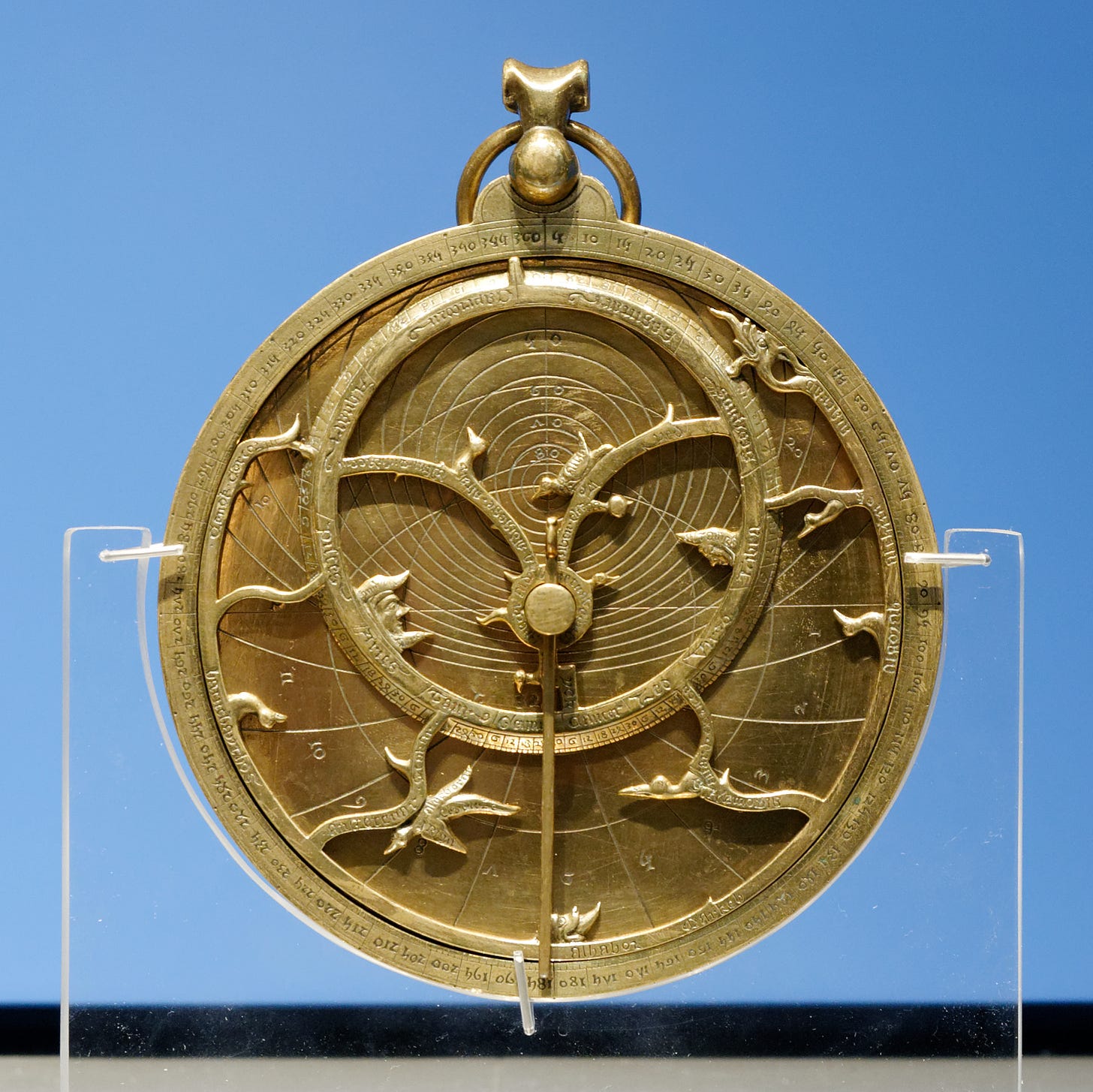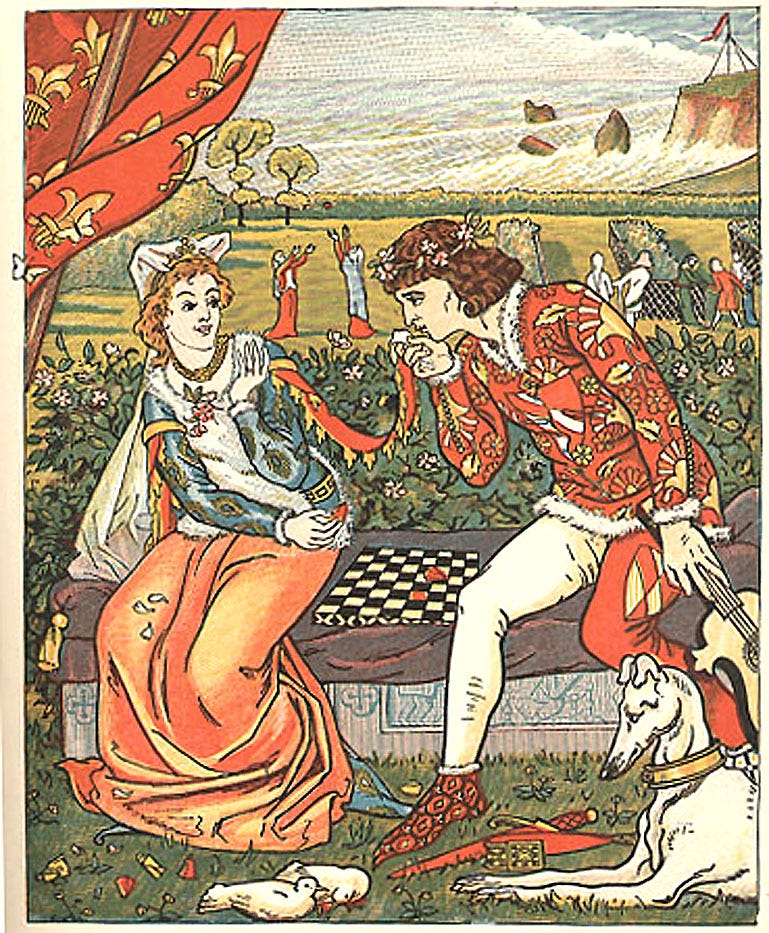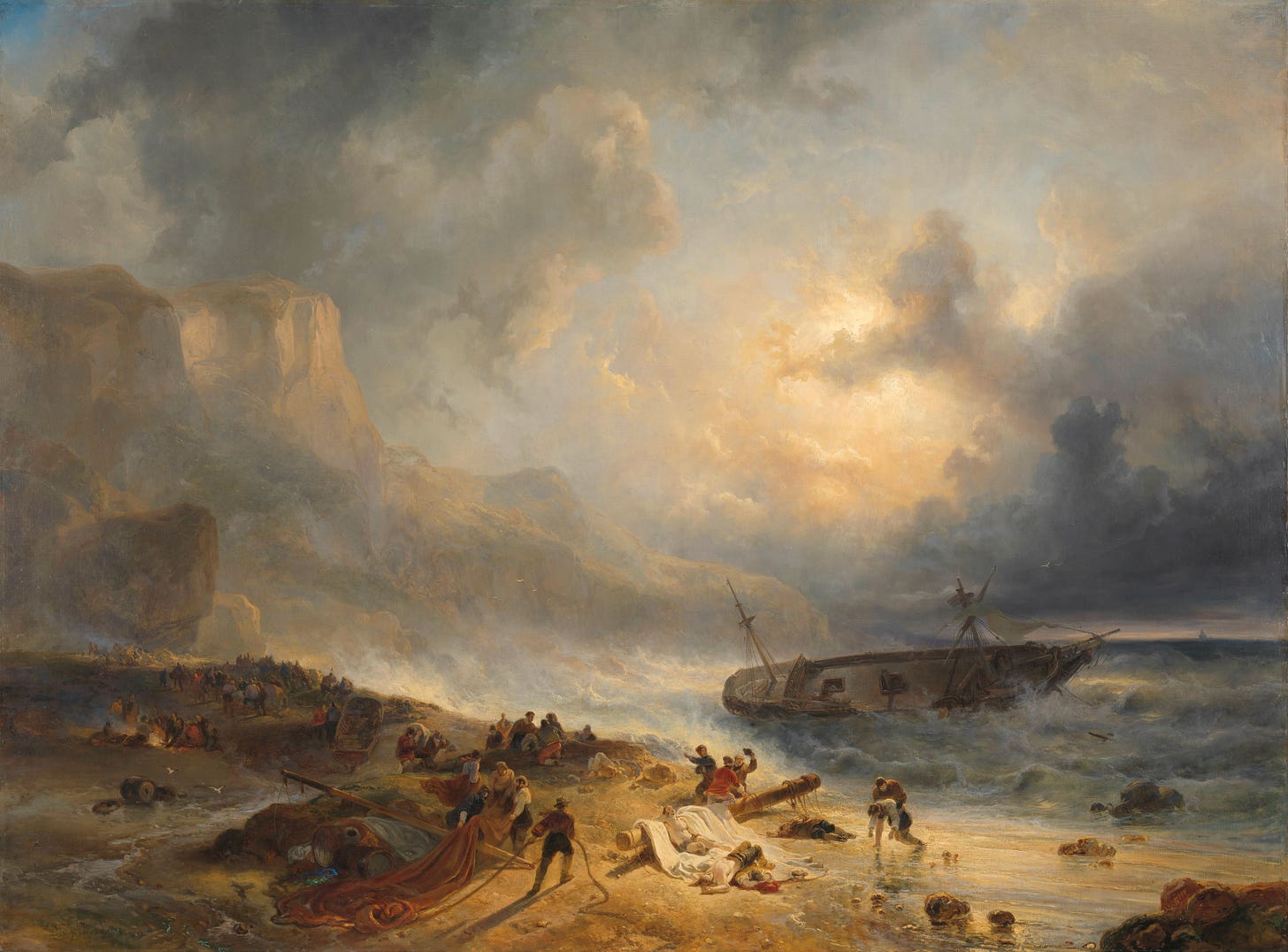It’s 1988. I’m on the stern of a ferry, watching the island of Gran Canaria gradually slip into the distance as the night swiftly came on. A few stars are visible. As we’d left the harbour, the captain and navigator had skilfully avoided the great black rocks that dotted the shore. The trade winds were blowing, as they always seemed to, and waves crashed against the rocks.
I thought of the “grisly feendly rokkes blake” from Chaucer’s The Franklin’s Tale, with which Dorigen becomes obsessed, fearing that they will sink the ship bringing her husband back from England.
And as the waves thudded dully against the hull of the ferry, I thought of George Crabbe’s lines in The Borough:
all the deep
Is restless change; the waves so swell'd and steep.
Behind me, in the direction the boat is heading, is Santa Cruz de Tenerife, the rival of Las Palmas de Gran Canaria and the capital of the other half of the Canary Islands. That city, I know, will already be pulsing with music. It’s February, and Europe’s largest carnival celebration is underway, and I’m planning to spend a few days with friends to enjoy that unique atmosphere of music and joy.
*
My final destination was London, however, where I’d study for a post-graduate diploma in teaching. I’d bought a one-way ticket from Tenerife to London, though I planned to go back Gran Canaria once I’d finished my course.
*

Recently, I chanced upon a mention of Chaucer’s A Treatise on the Astrolabe, written in the 1390s, the first document in English about a scientific instrument.
An English translation of a Latin version of an Arabic text, Chaucer apparently wrote it for his son. He didn’t finish it, but it still became one of the most read of his works during his lifetime.
I was charmed to think of Chaucer excitedly unboxing his son’s gleaming new astrolabe and painstakingly creating an instruction manual for him, translating a long text from a language his son didn’t read.
*
Perched on the north-west shoulder of Africa, the Canaries have long been a staging post for those sailing to South America. The earliest Europeans to arrive there would have probably used an astrolabe to navigate.
And, like so many who had lived in the Canaries before me, later that year I headed off to South America.
But, of course, I travelled by plane.
And rather than setting off from the Canaries, I left from London.
The truth is that after that slow departure by ferry in February, I didn’t return to Gran Canaria as I had planned.
In fact, I’ve never been back to the Canaries.

*
I recently reviewed this period in my life while reading John Ashbery’s Three Poems. I’d come across this arresting passage:
“Nevertheless the winter wears on and death follows death. I've tried it, and know how the narrowing-down feeling conflicts with the feeling of life's coming to a point, not a climax but a point. At that point one must, yes, be selective, but not selective in one's choices if you see what I mean. Not choose this or that because it pleases, merely to assume the idea of choosing, so that some things can be left behind. It doesn't matter which ones.”
I thought of my departure from Gran Canaria, of my life then coming to a point; and how I “assumed the idea of choosing” so that some things could be left behind.
True to form, I thought of the books I’d left behind. Among them were my hardback editions of most of Samuel Becket’s fiction. I’d been almost obsessed with Beckett in my university days. These were (for me) expensive and valuable books, but too heavy for my suitcase. But at the time, it didn’t seem to matter. I was coming back, wasn’t I?
I thought the topic might make a post for this newsletter. Perhaps I’d wittily call it “Abandoning Sam Beckett.” Books left behind and travel to faraway places; perfect material for the English Republic of Letters, I thought.

So I started rummaging through my attic of memories.
But almost immediately, I recoiled in shock. Because there was more to the story—a lot more. How had it somehow remained just out of sight in my mind’s eye?
I had left behind more than a few literary novels. I had left behind my partner, M, and the flat we shared by the beach, in the shadow of the ragged mountains of the island’s interior, where the roar of the surf was almost incessant.
*
It was not my intention when founding the English Republic of Letters to create a memoir exploring every detail of my intellectual or emotional life.
I set out to “join the dots” of a life spent travelling, reading, and living around the world, trying to decipher the bigger pattern that might emerge.
I’m not going to dwell here on what happened with M or why I never went back.
But I begin to see that as you join the dots of a life, the shapes that start to form aren’t always the ones you expect or want to see.
*
And as I wandered further through my memories, the idea of simply writing about “abandoning Sam Beckett” began to feel a bit like an evasion. Ok, I was leaving behind Murphy and Molloy and Malone and Mercier—all the well-known gang—as well as my prized copy of How It Is and novellas like First Love and Company. But that was just a bunch of books. Fictions; “pure figment,” in the words of the narrator of Ill Seen Ill Said.1
Why had I focussed only on them?
Whatever John Ashbery might say, perhaps it does matter what you leave behind.
*
Then I wondered, why hadn’t the whole story come to mind at the beginning rather than just the memory of leaving those books behind?
Freud always seems to have answers to questions I’ve never asked. But it turns out that he also had one about this: his theory of a screen (or cover) memory called Deckerinnerungen. This is defined as “a consciously acceptable memory unwittingly used to cover or screen out an associated experience which would be painful or unacceptable if called to mind.” Although such memories are commonly from childhood, they can be from later in life too.
I wasn’t seeking to erase my memories of that relationship. But they seemed to be covered in a cloak of invisibility or oblivion. Those books had served as a screen to hide them.
But whatever the explanation, just to write about leaving a few books behind and not to mention the emotional hinterland of my relationship with M, began to feel like a betrayal of my past and of her.
How could I write about these journeys of mine without acknowledging that our voyages are peopled, the vessels packed with passengers, and that every departure might be a final goodbye, every arrival bringing the chance (or need) to begin again?
*
Benjamin Britten's great opera, Peter Grimes, is loosely based on the poem by Crabbe from which I quoted earlier. There's a moment in the opera when the tenor launches into an eerily beautiful aria, which is like nothing else I know in music. It’s as if the music came from another realm altogether.
The words have great power too:
Now the great Bear and Pleiades
where earth moves
Are drawing up the clouds
of human grief
Breathing solemnity in the deep night.
Who can decipher
In storm or starlight
The written character
of a friendly fate –
As the sky turns, the world for us to change?2
The unanswered question, “Who can decipher... the written character of a friendly fate?” has come back to taunt me.
It makes me feel the lack of an astrolabe in the human heart that can help us navigate our lives or even decipher the patterns of the past.
We can join up stars to form constellations. We can join up points of ink to make pictures.
But I’m learning that joining up the dots of a life is not like the drawing activities I used to do as a kid.
In life, the dots aren’t numbered, and every time you try to join them, they seem to take a different form.

*
In Beckett’s play Endgame, one of the characters, Hamm, exclaims:
"Ah, the old questions, the old answers, there's nothing like them!" But as I explored my past, I felt like I was unearthing new questions requiring new answers.
Or were they the old questions requiring new answers?
*
Back in 1988, night had fallen when the ferry reached the dock in Santa Cruz de Tenerife. Most of the passengers stood on the bow, facing the well-lit harbour already throbbing with music. Behind us was the blankness of the Atlantic night, punctuated by a few stars.
None of us, of course, knows what lies ahead. And at that moment, I had no idea how the future would change what lay behind me and alter the shape of the past.
In The Franklin’s Tale, Dorigen is horribly deceived by a magic trick into thinking that the rocks have disappeared. If those “grisly feendly rokkes blake” - those black dots in the ocean—can disappear, then even the way we see the present isn’t clear.
As I stood on the ferry, looking back at the darkness where I thought Gran Canaria would be, I didn’t know that there would be no return journey. I didn’t know that my journey would not describe a circle but would follow a straight line heading westward. The shape of my story was changing, but I didn’t know it.
Sometimes the past is no clearer than the future.
*
As I thought of my one-way journeys and those lost books, and M, and everything that I abandoned back in 1988, I wondered:
Should I stop trying to join those dots?
I listened for the answer my mind might offer up.
Silence at first. Was there nothing to be done?
Then up bubbled some words, which I quickly recognised. They were from one of my favourites among Beckett’s later texts, Worstward Ho (1983)3:
“Ever tried. Ever failed. No matter. Try again. Fail again. Fail better.”
Published by Calder, 1982.
The libretto was by Montagu Slater. The opera premiered on June 7th, 1945.
One of the books I left behind.







It is so interesting how life interrupts any idea we have for it really. There is always something haunting about the places we thought we'd return to and didn't--what those lives would have looked like. And of course in reading this, I'm fascinated about what drew you there, what drew you elsewhere. Sometimes what looks like a straight line will eventually end up being a circle, if we go far enough.... Loved reading this.
All lovely to read, these unexpected connections and literary travels you have. The “unboxing” of Chaucer with his son was a fabulously imaginative scene!